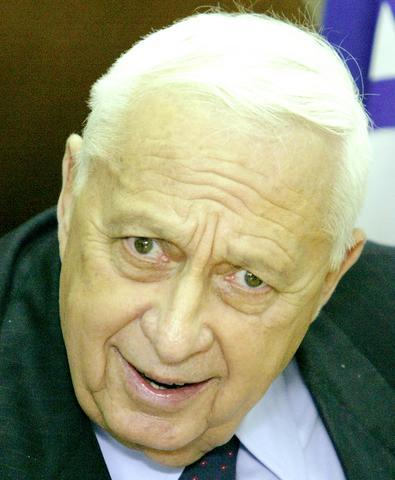The Israeli government decided in principle for the first time to remove long-established settlements from the West Bank and Gaza Strip, but Prime Minister Ariel Sharon's badly split Cabinet added provisions that cast doubt on the plan's implementation.
Sharon declared victory for his "unilateral disengagement" plan after Sunday's Cabinet vote, but opponents of settlement removal within his own Likud party were comfortable enough with the limits they imposed to go along with it -- and Palestinians were skeptical.

PHOTO: REUTERS
"Disengagement has begun," Sharon told a crowd of young Jews visiting Israel on a "birthright Israel" program just after the Cabinet vote. "The government decided today that by the end of 2005, Israel will leave Gaza and four settlements in the West Bank."
However, Cabinet opponents noted that no settlements could be removed unless approved by the Cabinet in another vote, probably no earlier than next March.
That would give settlers and their backers plenty of time to mount another campaign to scuttle the plan -- similar to the one they conducted among Likud members that led to the defeat of Sharon's disengagement proposal in a nonbinding party referendum on May 2.
The Cabinet defied the referendum results and its own ideology in its Sunday decision. Since the first Israeli settlements were established in 1968, a year after Israel captured the West Bank and Gaza in the 1967 Mideast war, no Israeli government had ordered the removal of authorized settlements there before, though some illegal outposts have been taken down.
Egypt is preparing to play a central role in a Gaza realignment. Israeli Foreign Minister Silvan Shalom was to travel to Cairo yesterday for talks about implementing the pullout plan. Egypt has offered to train Palestinian security forces and help them take control of Gaza once Israel leaves. Gaza is a stronghold of the militant Islamic group Hamas.
Shalom himself was one of the skeptics who was won over at the last minute by compromise wording that threw shadows over the possibility of implementing the plan. In the end, the proposal passed by a deceptively comfortable 14-7 margin.
The decision appeared to offer something for everyone. For Sharon and his backers, it stated, "Israel will leave the Gaza Strip, including the settlements there, and will redeploy outside the Strip."
Opponents pointed to a contradictory clause: "The Cabinet approves the amended disengagement plan, although this decision does not mean leaving settlements."
Sharon's proposal has already fractured the ruling four-party coalition and threatened its parliamentary majority, raising the prospect of a snap election even before the March vote on removing settlements.
To ensure a majority for the plan in his divided Cabinet, Sharon dismissed the two ministers from the far-right National Union Party. Another pro-settlement faction, the National Religious Party (NRP), was close to resigning.
"No word laundry can bleach one of the blackest decisions ever taken by an Israeli government, which means expulsion of thousands of residents and the creation of a Hamas terror state," said Housing Minister Effie Eitam, head of the NRP.

MAKING WAVES: China’s maritime militia could become a nontraditional threat in war, clogging up shipping lanes to prevent US or Japanese intervention, a report said About 1,900 Chinese ships flying flags of convenience and fishing vessels that participated in China’s military exercises around Taiwan last month and in January have been listed for monitoring, Coast Guard Administration (CGA) Deputy Director-General Hsieh Ching-chin (謝慶欽) said yesterday. Following amendments to the Commercial Port Act (商港法) and the Law of Ships (船舶法) last month, the CGA can designate possible berthing areas or deny ports of call for vessels suspected of loitering around areas where undersea cables can be accessed, Oceans Affairs Council Minister Kuan Bi-ling (管碧玲) said. The list of suspected ships, originally 300, had risen to about 1,900 as

Right-wing political scientist Laura Fernandez on Sunday won Costa Rica’s presidential election by a landslide, after promising to crack down on rising violence linked to the cocaine trade. Fernandez’s nearest rival, economist Alvaro Ramos, conceded defeat as results showed the ruling party far exceeding the threshold of 40 percent needed to avoid a runoff. With 94 percent of polling stations counted, the political heir of outgoing Costa Rican President Rodrigo Chaves had captured 48.3 percent of the vote compared with Ramos’ 33.4 percent, the Supreme Electoral Tribunal said. As soon as the first results were announced, members of Fernandez’s Sovereign People’s Party

MORE RESPONSIBILITY: Draftees would be expected to fight alongside professional soldiers, likely requiring the transformation of some training brigades into combat units The armed forces are to start incorporating new conscripts into combined arms brigades this year to enhance combat readiness, the Executive Yuan’s latest policy report said. The new policy would affect Taiwanese men entering the military for their compulsory service, which was extended to one year under reforms by then-president Tsai Ing-wen (蔡英文) in 2022. The conscripts would be trained to operate machine guns, uncrewed aerial vehicles, anti-tank guided missile launchers and Stinger air defense systems, the report said, adding that the basic training would be lengthened to eight weeks. After basic training, conscripts would be sorted into infantry battalions that would take

GROWING AMBITIONS: The scale and tempo of the operations show that the Strait has become the core theater for China to expand its security interests, the report said Chinese military aircraft incursions around Taiwan have surged nearly 15-fold over the past five years, according to a report released yesterday by the Democratic Progressive Party’s (DPP) Department of China Affairs. Sorties in the Taiwan Strait were previously irregular, totaling 380 in 2020, but have since evolved into routine operations, the report showed. “This demonstrates that the Taiwan Strait has become both the starting point and testing ground for Beijing’s expansionist ambitions,” it said. Driven by military expansionism, China is systematically pursuing actions aimed at altering the regional “status quo,” the department said, adding that Taiwan represents the most critical link in China’s